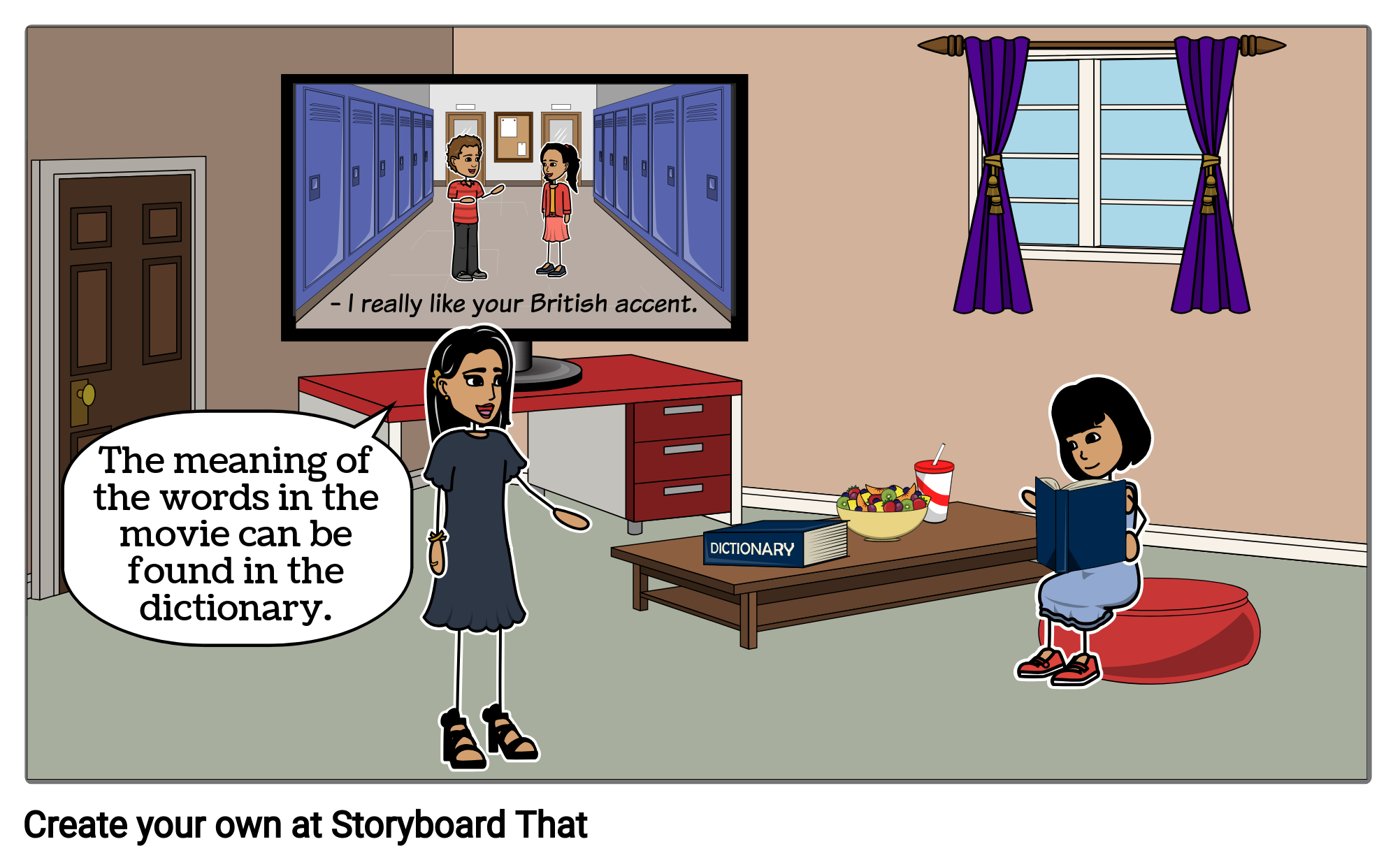LESSON GOAL
Let’s check our lesson goal.
In this material, you will learn the words and phrases when talking about
communication and foreign language learning and express your opinions about specific topics.
In this material, you will learn the words and phrases when talking about
communication and foreign language learning and express your opinions about specific topics.
この教材では、外国語とコミュニケーションに関連した語彙や表現を学び、特定の話題について意見を述べる練習をします。
PART A_1
Please study the picture below. Then, describe it in as much detail as you can.
PART A_2

| Answer: | |
| . |
PART A_3
Now, let me ask you a question about the picture.
PART A_4
| 1. | How can the girl learn the English language? |
| Answer: |
PART A_5
Now, let us review your answers.
(Please review your student’s answers by sending the correct answers in complete sentences. After that, ask your student to read aloud his or her corrected answers.)
PART A_6
Choose the correct meaning of the underlined word in each sentence.
PART A_7
| 1. | They use terms that only they could understand. |
| a. | [noun] an occasion when people communicate with each other |
| b. | [noun] a word or phrase used to describe a particular thing |
| c. | [adjective] able to express thoughts and feelings easily and clearly |
| 2. | Mandarin is one of the most complex languages. |
| a. | [noun] all the words that exist in a particular language or subject |
| b. | [adjective] involving different but connected parts that are confusing |
| c. | [adjective] liking to talk a lot in a friendly, informal way |
| 3. | I had a tough time understanding them. |
| a. | [adjective] something that is difficult |
| b. | [verb] to talk about your thoughts and feelings, and help other people to understand them |
| c. | [noun] a short piece of information that is given to someone |
| 4. | People say that my American accent sounds weird. |
| a. | [noun] the ability to talk, the activity of talking, or a piece of spoken language |
| b. | [noun] news, facts, or knowledge |
| c. | [noun] the way people in a particular area, country or social group pronounce words |
| 5. | Idioms are expressions that have different meanings. |
| a. | [noun] a word or phrase used in a particular situation or by particular people |
| b. | [noun] not straight or direct |
| c. | [noun] communication with someone, especially by speaking to them regularly |
PART A_8
Now, let us review your answers.
(Please review your student’s answers by sending the correct answers in complete sentences. After that, ask your student to read aloud his or her corrected answers.)
PART B_1
Please construct your own sentences using the following words.
PART B_2
| 1. | term | Answer: | . | |
| 2. | tough | Answer: | . | |
| 3. | complex | Answer: | . | |
| 4. | accent | Answer: | . | |
| 5. | expression | Answer: | . |
PART B_3
Now, let us review your answers.
(Please review your student’s answers by sending the correct answers in complete sentences. After that, ask your student to read aloud his or her corrected answers.)
PART C_1
Please complete each sentence by choosing the correct answer in the box below.
PART C_2
| accent | tough | complex |
| expression | language | term |
| 1. | I find it hard to understand ____________ issues. |
| 2. | He speaks Japanese in British ____________. |
| 3. | There are American ____________ that have different meanings in British. |
| 4. | There are ____________ in the countryside that I cannot understand. |
| 5. | He had to make a ____________ choice. |
PART C_3
Now, let us review your answers.
(Please review your student’s answers by sending the correct answers in complete sentences. After that, ask your student to read aloud his or her corrected answers.)
PART D_1
Let’s talk. Please answer the questions by stating your opinions.
PART D_2
| 1. | Some people say that studying English is unnecessary. What do you think about that? |
| Answer: | |
| 2. | English is the universal language. Do you agree or disagree? |
| Answer: |
PART E_1
Now, I will ask you the following questions. You may ask questions, too.
PART E_2
| 1. | Why are you studying English? |
| Answer: | |
| 2. | What method do you use to learn English faster? |
| Answer: | |
| 3. | What language do you want to learn the most? Why? |
| Answer: | |
| 4. | What do you think is the best way to learn a foreign language? |
| Answer: | |
| 5. | What do you think is the importance of studying other languages? |
| Answer: | |
| 6. | What do you think is the most important aspect of communicating with others? |
| Answer: | |
| 7. | Do you think studying foreign language in school should be required? |
| Answer: |
REVIEW AND FEEDBACK
Now, let us review the things that you learned in this lesson.
ではこのレッスンで学んだことを振り返りましょう。
(Please give a short feedback on how your student did on your class.)
| Grammar 文法 |
Pronunciation 発音 | Vocabulary 単語 |
Comprehension 理解 |
|
|---|---|---|---|---|
 GOOD GOOD |
文法の誤りはほとんどなく、完全な文章で話すことができる | ほとんどの単語をはっきりと正しく発音することができる | 習った表現を適切に使うことができる | 文章を理解し、質問に正しく答えることができる |
 FAIR |
文法の誤りはあるが、完全な文章で話すことができる | 発音の練習が必要な言葉がいくつかある | たまにミスはあるが、習った表現を適切に使うことができる | 文章を完全に理解するのは難しく、質問に正しく答えられないときもある |
 POOR |
文章で話すのは難しく、単語だけで話すことができる | 発音の練習が必要である | 習った単語と表現を少しだけ使うことができる | 文章を理解するのは難しく、質問に答えるのは難しい |
レッスン教材に関するアンケートのお願い
レッスン教材の改善・拡充を図ることを目的とし、アンケートを実施しております。
以下のURLからアンケートにお答えいただき、 ご意見・ご要望をお聞かせください。
アンケートはこちら